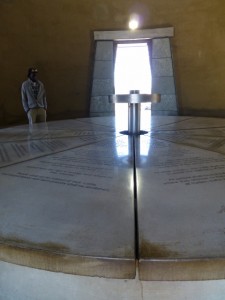We continued our tour through a part of Soweto, called Kliptown, one of the oldest parts of the formerly black township. I felt a little uncomfortable “touring” here, like an intruder. People were welcoming and politely smiled, but as we entered their township, we heard a man yell stop exposing us. We were unsure whether the man had issue with us or our tour guide, but this made me uneasy. As we walked through the village, I felt like we were treating the people there as if they were in a museum, even if unintentionally. I was invading their privacy and homes, without getting to know them. I kept wondering how I would feel if the tables were turned.
We (including myself) justified this by saying we are trying to educate ourselves and exposure is necessary to advocate for people in poor situations, but I’m unsure how much good has come from this exposure. After all the failed efforts the people in Kliptown have been victim to, I expected a little animosity toward tourists like myself. Nevertheless, we walked through and gawked at their poverty. My group has the best intentions (I truly believe), so my criticism may seem harsh, but I think we need to think deeper about how we try to educate ourselves. Staring at people doesn’t provide you an understanding, it emphasizes a stereotype, but I look forward to digging a little deeper on this trip.
In this town, our tour guide explained to us the many things that these people need and the disappointments from the government. Non-governmental groups have offered some hope for change, but many of my classmates wondered if the requests of the residents were unrealistic. Their problems might be more easily solved if they were willing to move from their community, but their resistance caused complications. On one hand, I thought these people shouldn’t have to move after being forced there in the first place, but also grappled with the fact that that may be the only viable solution. Being that our guide was a member of the community, he could only offer his perspective about this issue. At times his arguments were circular, perhaps because this issue struck him emotionally. We found this somewhat confusing and frustrating, so later on we got clarification and heard from a man that I can refer to only as brilliant.
Dale McKinley is an economist that works partially in academia. He was enthusiastic, articulate, and could simplify concepts so that we could wrap our heads around them. He emphasized the need to build societies through the lowest classes, investing in communities like Kliptown. This was the only way to redistribute the huge accumulation of wealth found in the majorly white cities of Pretoria and Northern Johannesburg. Though he admitted there was so “silver bullet” to fixing South Africa’s economy, he did suggest that in order to shrink economic disparities the government needed oppose further privatization.
Our discussion of privatizing water companies sent my mind reeling. He made the very good point that water is being taken from where many of these people live and then resold to them through private French companies. They provide no other benefit or maintenance to the community and so the people feel they are deserved free water. I realized that in the United States we expect things like these. If you have a well, you don’t pay for the water that you use and if someone took that water and offered to sell it back to you that would be outrageous. However, when living in a town you pay for sewage to be disposed of, water to be cleaned, and facilities to be kept up. We don’t object to paying for those services and Dale emphasized that if the people of Kliptown were receiving similar treatment they would be willing to pay also.
 He then talked about the relationship between government and large business owners. He mentioned things like the rate that water is sold to people in communities like Kliptown is almost 6 times what is sold to the government. So while people in government may complain about the financial responsibility of providing water to people who are dying in these communities, the government is receiving a discounted rate.
He then talked about the relationship between government and large business owners. He mentioned things like the rate that water is sold to people in communities like Kliptown is almost 6 times what is sold to the government. So while people in government may complain about the financial responsibility of providing water to people who are dying in these communities, the government is receiving a discounted rate.
Ironically, located directly across the street from this impoverished neighborhood was a monument in dedication to the Freedom Charter, a document that encompasses the core values of the’ new’ South Africa. It addressed the rights of all people emphasizing equality among race, gender, and class. It even states: “The mineral wealth beneath the soil, the banks and the monopoly industry shall be transferred to the ownership of the people as a whole”

Leave a Reply